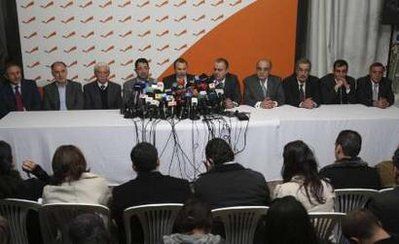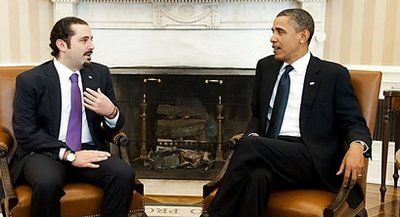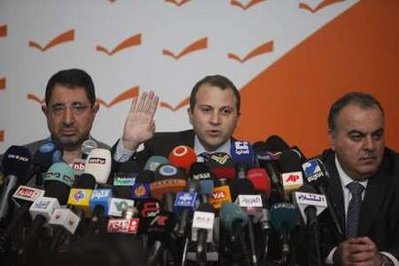


From left, Lebanese Ministers Ali Abdallah, Mohammed Fneish, Abraham Dedeyan, Hussein Hajj Hassan, Jibran Bassil, Mohammed Jawad Khalife, Fady Abboud, Charbel Nahhas, Youssef Saade and Ali Shami hold a press conference to announce their resignation in the northern Beirut suburb of Rabieh, Lebanon, Wednesday, Jan. 12, 2011. Lebanon's government collapsed After this press conference a Minister from the coalition of President Suleiman minister Adnan Sayyed Hussein presented its resignation too which conclude 11 ministers resigning 1/3 of the government. Hence the government collapse

Lebanese Prime Minister Saad Hariri (L) meets with US President Barack Obama Wednesday at the moment that Hezbollah and its allies resigned from the Lebanese government, according to an AFP photographer. The two men were meeting in the Oval Office at the White House, smiling as they posed for photographers, without making any statements. (Nader Hariri was in company with PM Hariri

Lebanese opposition Ministers : Gebran Bassil (C), Lebanon's Minister of Energy and Water and allied to Hezbollah, announces a resignation statement as Mohammad Khalifeh (R), Minister of Health, and Hussein Haj Hassan, Minister of Agriculture, listen during a news conference in Rabieh, near Beirut, January 12, 2011. Lebanese minister Adnan Sayyed Hussein resigned on Wednesday, the state news agency said, bringing to 11 the number of ministerial resignations and effectively collapsing the government of Prime Minister Saad al-Hariri
A Lebanese official says Hezbollah ministers and FPM (Free Patriotic Movement) leaded by MP General Aoun and Marada Party leaded by Frangieh allies have resigned from the Cabinet, bringing the government to the brink of collapse.
Energy Minister Jibran Bassil told a news conference Wednesday that 10 ministers are pulling out. They need just one more minister to resign in order to force the government to fall and an 11th minister could resign later in the day.
The ministers are stepping down from the 30-member Cabinet over tensions stemming from a U.N.-backed tribunal investigating the assassination of a Former Prime Minister Rafik Harir
resignation of eleven ministers including a minister that represent President Michel Suleiman that reresent from the government's unity coalition Wednesday, which would topple the government and raise concerns of new protests and paralysis in Lebanon.
The Daily Star of Lebanon reports that the resignations, which were to be announced this afternoon local time, were due to Hezbollah and its allies being rabuffed in their demands for an emergency cabinet meeting Tuesday to discuss Lebanese cooperation in the United Nation's Special Tribunal for Lebanon (STL). The STL is investigating the 2005 assassination of Prime Minister Rafik Hariri, father of current Prime Minister Saad Hariri, who has refused to end Lebanese participation in the US-backed tribunal. Several Hezbollah members are expected to be indicted by the tribunal for involvement in the assassination.
WASHINGTON – President Barack Obama and Lebanese Prime Minister Saad Hariri on Wednesday reaffirmed their commitment to strengthening Lebanon's sovereignty and independence even as Hezbollah ministers forced the year-old unity government to collapse.
Hariri made no public comment after the Oval Office visit and immediately departed for France to consult with President Nicolas Sarkozy before returning to Beirut, according to a Lebanese official who spoke on condition of anonymity to discuss sensitive diplomatic moves
A White House statement issued after the meeting said Obama had commended Hariri for his "steadfast leadership and efforts to reach peace, stability and consensus in Lebanon under difficult circumstances."
A source told the Daily Star that Hezbollah and Free Patriotic movement sought the emergency cabinet meeting "to stop payment of Lebanon’s share toward the financing of the S.T.L., withdraw the Lebanese judges from the tribunal, end Lebanon’s cooperation with the S.T.L., and prosecute the 'false witnesses' linked to the U.N. probe into Rafik Hariri’s killing..." They warned that failure to hold the meeting would result in the mass resignations of its cabinet members, bringing down the government.
Hilal Khashan, professor of political science at the American University in Beirut, says that it is unlikely that Hezbollah will respond to the political crisis by sending gunmen into the streets of Beirut as it did in May 2008, Reuters reports. But Mr. Khashan says that street protests are a possibility. "The phenomenon of food riots is spreading in the Arab world, so the opposition may shield itself behind popular demands for combating inflation," he said.
The resignations come after a last-ditch effort by Saudi Arabia and Syria, who represent the opposing Lebanese factions, failed to bring about a compromise. Al Jazeera reports that the negotiations between the Saudis and Syrians were thought to be the best chance to avoid political crisis in Lebanon, but that they reached a "dead end" according to Michel Aoun, leader of the Free Patriotic Movement and Hezbollah ally. Hezbollah laid blame at the feet of the US, Al Jazeera adds.
Hezbollah, which has rejected allegations it was involved in the suicide bombing on the Beirut seafront in 2005 that killed Hariri and 22 others, blamed "American intervention and the inability of the other side to overcome American pressure" for the failure to reach a compromise.
When asked why the talks collapsed, Mohammed Fneish, a Hezbollah cabinet minister, said: "Ask Mrs Clinton," referring to the US secretary of State.
Prime Minister Hariri, who is in the US and scheduled to meet with US President Barack Obama Wednesday, responded to the failure of the Saudi-Syria talks with a pledge to continue to work to maintain the peace in Lebanon, reports the Associated Press. "Despite the developments of the last few hours, we will use all possible means to keep channels open to all the Lebanese to reach solutions that guarantee stability and calm and preserve national unity," he said.
The Christian Science Monitor reported last month that the tribunal is expected to
in its initial response to the Hariri assassination, but that additional indictments could come. The Monitor adds that while Hezbollah has emerged as the primary suspect in the initial investigation, the plot is "multi-tiered and involved a large network of people," and investigators still consider Syria, which backs Hezbollah, to be a major player in the schem
TIme: Nicholas Blanford / Beirut
Few would have imagined, when a massive explosion killed former Prime Minister Rafik Hariri in February 2005, that the aftershocks of the blast would be powerful enough to bring down Lebanon's government six years later. The fragile coalition government led by Hariri's son, Saad, collapsed on Wednesday in a dispute over how to respond to the imminent release of a U.N. tribunal's indictments of those accused of the murder, plunging this divided and conflict-weary country once more into the spotlight of regional anxiety.
Lebanon's government is dissolved when more than one third of its 30 cabinet members withdraw, and on Wednesday all 10 ministers belonging to the opposition led by the militant Shi'ite Hizballah movement announced their resignations. Hours later, they were joined by an eleventh minister representing Michel Suleiman, the Christian president, forcing the collapse of Saad Hariri's government. (See photographs of Hizballah's boy scouts.)
The cabinet resignations, said Labor Minister and Hizballah opponent Butros Harb, "has obstructed matters in Lebanon and further complicated issues". Even as his government was foundering in Beirut, Hariri was heading into the White House to meet with President Barack Obama on Lebanon's political crisis. "The efforts by the Hizballah-led coalition to collapse the Lebanese government only demonstrate their own fear and determination to block the government's ability to conduct its business and advance the aspirations of all the Lebanese people," said a statement released by the White House following the meeting. But it was unclear whether Hariri could expect more than moral support from Washington. (Read how Hizballah has tried to shift the blame on Hariri's killing.)
Hariri left Washington immediately after his meeting with Obama, and headed to Paris where he will hold talks on Thursday with French President Nicolas Sarkozy, before returning to Beirut.
Lebanon's government had been deadlocked on the issue of the international tribunal, which is widely reported to be planning to indict Hizballah members in the killing. Hizballah has denied any involvement in Rafik Hariri's death, and accuses the tribunal of serving the political agenda of the United States and Israel. (Watch video of Hizballah's war theme park.)
Saad Hariri, at the head of a fragile coalition put in place in 2009 — a year after Hizballah had prevailed in a brief battle for the streets — has faced mounting pressure from the Shi'ite movement and its allies in recent months to declare the tribunal politically tainted and to suspend all cooperation with it. But Mr Hariri, a Sunni backed by Saudi Arabia, has refused to yield, even has he faced an impossible choice: As the son of the murdered former premier, bowing to Hizballah's demands would discredit him in the eyes of Lebanese Sunnis and doom his political career; but maintaining his support for the tribunal risked bringing on a violent destabilization of Lebanon after Hizballah, whose militia remains the most powerful armed force on the ground, made clear it would not allow any of its members to be arrested.
The catalyst for the opposition walkout appears to have been the failure of a five-month mediation effort by Syria and Saudi Arabia to find a compromise. Both countries wield extensive influence in Lebanon. The Saudis are Hariri's key backers, while Syria has been a patron of Hizballah and maintained de facto control over Lebanese affairs from 1976 until it was forced to withdraw its military following the Hariri assassination. Indeed, Damascus was initially fingered as the chief suspect in the killing, and has not been absolved even as the accusatory spotlight has shifted to Hizballah in the past 18 months.
Many observers were skeptical that the Syrian-Saudi mediation effort could square the circle of conflicting interests over the tribunal. But Mohammed Fneish, a Hizballah minister who resigned Wednesday, blamed "American intervention" for the failure of the Syrian-Saudi mediation effort, and accused Hariri of succumbing to U.S. pressure to continue supporting the tribunal.
So where does Lebanon go from here?
Analysts say Hizballah's priority is to try and forge a consensus in Lebanon to disavow the tribunal. Lebanese and foreign judges sit on the tribunal and the funding is split between Lebanon and international donor states. The best Hizballah could expect from the most pliant government would be a withdrawal of Lebanese judges and Lebanon's share of the funding, and a refusal to accept or implement any indictments. Such a step would temporarily slow down the tribunal, but it would not kill it off. The tribunal is sanctioned by the United Nations Security Council, which has the power to amend its mandate and continue its work irrespective of developments in Lebanon.
But the collapse of the government could herald a prolonged political paralysis similar to the gridlock that prevailed between November 2006 and May 2008. That crisis climaxed with Hizballah and allied fighters taking control of the streets in Sunni neighborhoods in several days of fighting that brought Lebanon to the brink of civil war. Although a compromise deal brokered by Qatar restored calm, Shi'ite-Sunni tensions have simmered. Many Lebanese are now asking whether Hizballah will once again seek to impose its will on the streets. Many expect street protests, isolated outbursts of factional violence and possibly even a return to the assassinations and bombings that plagued Lebanon in the wake of Hariri's death. But even though its military prowess is unchallenged in Lebanon, Hizballah's leaders have plenty of reasons to avoid an all-out war.
Still, the anticipation of the Hariri murder indictments is exacerbating already fraught nerves. The tribunal's prosecutors are expected in the coming days to hand their evidence to the pre-trial judge, who will assess whether the case is legally sound before allowing the indictments to be served. Sources briefed on the workings of the tribunal told TIME they expect the indictments to be made public at the end of February or early March.
Sheikh Hassan Nasrallah, Hizballah's leader, has said he will not surrender any indicted Hizballah men to the tribunal and has vowed to "cut off the hands" of anyone attempting to arrest them.
Some Lebanese leaders argue that the country has to choose between justice for the murdered Hariri or stability for Lebanon. The resolve of those that still seek both may be sorely tested in the months ahead.
Read more:
http://www.time.com/time/world/article/0,8599,2042111,00.html#ixzz1Arg5oGIF